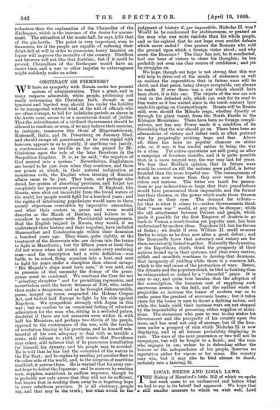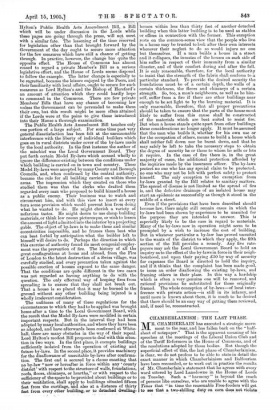LOCAL NEEDS AND LOCAL LAWS.
THE Bishop of Hereford's little Bill of which we spoke last week came to an undeserved end before what we had to say in its behalf had appeared. We hope that a still smaller measure to which we wish well, Lord Hylton'a Public Health Acts Amendment Bill, a Bill which will be under discussion in the Lords . while these pages are going through the press, will iipt meet, with a similar fate. The lessening of the time reserved for legislation other than that brought forward by. the Government of the day ought to secure more attention for the few measures which have still a chance of getting through. In practice, however, the change has quite the opposite effect. The House of Commons has almost ceased to reerard a private Member's Bill as a serious legislative effort, and the House of Lords seems, disposed to follow the example. The latter change is especially to be regretted, because the leisure enjoyed by the Peers, and their familiarity with local affairs, ought to secure for such measures as Lord Hylton's and the Bishop of Hereford's an amount of attention which they could hardly hope to command in the ' Commons. There are few private Members' Bills that have any chance of becoming law unless the Government can be persuaded to make them their own, but this result might be more often attained if the Lords were at the pains to give those introduced into their House a thorough examination.
The Public Health Acts Amendment Bill touches only one portion of a large subject. For some time past very general dissatisfaction has been felt at the unreasonable interference with the liberty of individual builders which goes on in rural districts under cover of the by-laws made by the local authority. In the first instance the author of the mischief was the Local Government Board. They put forth certain Model By-laws which seemed wholly to ignore the difference existing between the conditions under which building is carried on in town and country. These Model By-laws were accepted by many County and Borough Councils, and, when confirmed by the central authority, became the rule for all building carried on within those areas. The impression which they created on those who studied them was that the clerks who drafted them regarded every man who proposed to bUild himself a house as a public enemy. Their bUsiness was to watch and circumvent him, and with this view to insert at every turn some provision which would prevent him from doing what he wanted to do. He might cherish a variety of nefarious tastes. He might desire to use cheap building materials, or think low rooms picturesque, or wish to lessen the amount of light admitted into the interior by a projecting gable. The object of by-laws is to make these and similar eccentricities impossible, and he frames them best who call best forbid by anticipation what the builder left to himself will desire to do. Perhaps the direction in which this exercise of authority found its most congenial employ- ment was the prevention of fire. The history of all the great conflagrations at- home and abroad, from the Fire of London to the latest destruction of a Swiss village, was carefully studied, and every precaution taken against the possible erection of houses exposed to the same danger. That the conditions are quite different in the two cases was not regarded as having anything to do with the question. The only effectual way of keeping fires from spreading is to ensure that they 'shall not break out. That a house is so placed that it may be burned to the ground without any other building being injured is a wholly irrelevant consideration. The unfitness of many of these regulations for the circumstances to which they had to be applied was brought home after a time to the Local Government Board, with the result that the Model By-laws were modified in certain important respects. But in the interval they had been adopted by many local authorities, and where they have been so adopted, and have afterwards been confirmed at White- hall, there are many obstacles in the way Of their repeal. Lord Hylton's modest Bill proposes to deal with this situa- tion in two ways. In the first place, it exempts buildings sufficiently isolated from the operation of existing and future by-laws. In the second place, it provides t nery for the disallowance of unsuitable by-laws after confirma- tion. The first end is secured by a clause enacting that no by-law "now or hereafter in force within any county district' with respect to the structure of walls, foundations, roofs, floors, chimneys, or hearths," or with respect to the sufficiency of the space to be provided about buildings or to their ventilation, shall apply to buildings situated fifteen feet from the curtilage, and also at a distance of thirty feet from every other building, or to detached dwelling- houses within less than thirty feet of another detached building when this latter building is to be used as stables or offices in connection with the former. This exception rests on the common-sense view that tho people who live in a house may be trusted to look after their own interests whenever their neglect to do so would injure no one but themselves. If a man builds a house in a street and it collapses, the inmates of the houses on each side of him suffer in respect of their immunity from a similar disaster, and of their comfort during and after the fall. It is only reasonable, therefore, for the local authority to insist that the strength of the fabric shall conform to a particular standard. To provide the desired security the foundations must be of a certain depth, the walls of a certain thickness, the floors and chimneys of a certain strength. So, too, a man's neighbours, as well as he him- self, suffer from a fire if there are other buildings near enough to be set light to by the burning material. It is only reasonable, therefore, that all proper precautions should be taken to ensure that the parts of the house most likely to suffer from this cause shall be constructed of the materials which are best suited to resist fire. But when a house stands quite apart from other buildings these considerations no longer apply. It must be assumed that the man who builds it, whether for his own use or for the occupation of others, means to build a house which shall neither fall down nor be burnt down, and that he may safely be left to take the necessary steps to obtain the degree of security he or those to whom he sells or lets it require. In the case of fire there is, in the great majority of cases, the additional protection afforded by the inquiries made by the insurance officer. The by-laws protect no one who has any special claim to be protected, no one who may not be left with perfect safety to protect himself. The only exception to the exemption from by-laws granted by the Bill relates to sanitary matters. The spread of disease is not limited as the spread of fire is, and the defective drainage of an isolated house may start an epidemic as successfully as though it stood in the middle of a street.
Even if the provisions that have been described should become law, there might still remain cases in which the ' by-laws had been shown by experience to be unsuited for the purpose they are intended to answer. This is especially likely to be the case in regard to materials. ' Many of the by-laws now in operation might seem to be prompted by a wish to increase the cost of building. But in whatever particular a by-law has proved unsuited to the wants of the district to which they apply, the fifth section of the Bill provides a remedy. Any five rate- payers may ask the Local Government Board to hold an inquiry as to the effect of the by-laws in force in their neigh- bourhood, and upon their paying £50 by way of security for expenses the Board is directed to hold the inquiry, and if it thinks that the complaint has been made good, to issue an order disallowing the existing by-laws, and framing others in their place. In this way a hardship which is often a very genuine one will be removed, and rational provisions be substituted for those originally framed. The whole conception of by-laws—of local inter- ference with private action—is still in its infancy, and until more is known about them, it is much to be desired that there should be an easy way of getting them reviewed, and, if need be, reconstructed.











































 Previous page
Previous page